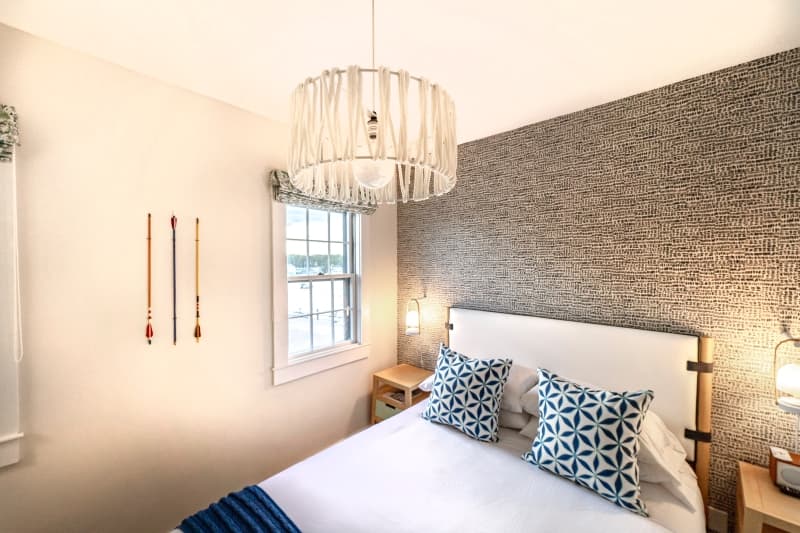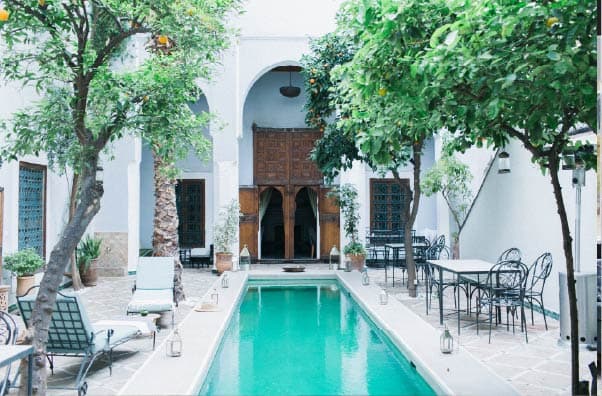A boutique hotel differs from a chain hotel or a larger property because it’s designed to offer a personalized service, featuring unique characteristics like design elements and special amenities, as well as offering something above and beyond a traditional hotel. It is designed to cater to a more targeted audience that values service and uniqueness beyond price.
There are no precise characteristics to define a hotel as “boutique,” but essentially it is a hotel that is small and unique, and that is meant to cater to a specific target audience that will value these traits. Let’s look at the term more in depth, find out the origin of this type of establishment, and cover some must-haves for a boutique hotel.
Table of contents
What does boutique mean in the hospitality industry?
According to the Oxford Dictionary, a boutique hotel is a “small stylish hotel, typically one located in a fashionable urban location”. It goes above and beyond a traditional hotel in the sense that they seek to offer a more personal approach to the hotel experience, using personalization, excellent service, added amenities and a focus on design to distinguish themselves from a traditional hotel.
While the term is loosely used even for larger hotels who claim to offer a more unique or thematic experience, in reality it started as a way for smaller hotels to differentiate themselves from the competition by offering a more intimate or customized hotel stay.
What is the origin of boutique hotels?
To discuss the origin of boutique hotels, we could go as far back as the year 1200 where staging posts were set up for travelers, and those who provided the best and most comfortable services for guests and their horses were set apart from the competition. Fast-forward to 1880 and the Sagamore Hotel, a 96 room hotel in New York, was the first to offer a ground-breaking amenity: electricity.
As chain hotels emerged in the 1940s and 50s with the likes of Marriott and Hilton, more and more, it was necessary for hotels to distinguish themselves from the competition. However, the true arrival of the boutique hotel as we know it today dates back around 20 years, designed to offer unique services and experiences in one-of-a-kind destinations around the world.

What are the essentials for a boutique hotel?
While the requirements for a boutique hotel are not regulated like the star system, there is an implied list of essentials that structures calling themselves with this term should try to abide by. Let's take a look.
1. Fewer than 100 rooms
No one is going to take away your boutique status if you have 102 rooms, but as a general rule, size does matter. Keeping your hotel under 100 rooms is a way of controlling quality, and being able to offer a more personalized service. As soon as you get above 100 rooms, it becomes harder and harder to cater to your guest’s needs, which should be the standout feature of this kind of establishment.
Discover simple ways to enhance the guest experience.
2. Be located in a singular location
You know what they say: “location, location, location”, and for a boutique hotel, location matters most. Whether you are in the coolest, hippest neighborhood in Brooklyn or in the midst of the Red-Light District in Amsterdam, your property needs to have a sense of identity that is created and improved by its location. Let the location define your property, and let your property blend into its surroundings.
Some nods to your location could be serving local food at your hotel’s restaurant, working with local brands to design your hotel, or having real locals work at your hotel. This connection with the location is fundamental.
3. It’s the “it” place to be
Just as a hotel should blend into its surroundings, it should also be a place where locals feel like they’re a part of the hotel. Make your property the “it” place for locals to hang out, whether it’s in a hotel's lobby, bar or restaurant, finding ways to involve the local population is a great way to boost occupancy rate in the off season. This also creates a unique identity for your property that sets you apart from the competition.
4. A stand-alone property
While some chains have jumped on the bandwagon and acquired boutique hotels, the real essence should be that it is independent and doesn’t belong to a chain. This allows its true identity to shine and to offer that one-of-a-kind experience that these kinds of hotels are targeting.
5. It incorporates design elements
Authentic design elements are a great way to distinguish your hotel from the competition. Whether your hotel combines architectural elements, stylish furniture, decor from local designers or interesting art, the design of your hotel will really make the difference, and allow your hotel to show its true personality and singularity.
6. A unique offering
When we talk about a unique offering, it could refer to a lot of different elements. It could be referring to the amenities or services that are unlike other hotels, or it could be add-ons like tours, a spa, or a dinner with a Michelin-starred chef. Amenities are also a great way to make the difference, and guests will remember you for them.
Find out what amenities you can provide to wow your guests.
7. Be hip and trendy
Not to say that this kind of structure has to be trendy, but being hip and trendy is what can set you apart from a chain hotel. By following the latest trends in technology, design, and trending topics, you can become Instagrammable, which is not only great for your reputation but also gives you a huge competitive advantage.
Discover how social media affects traveler decisions.
Beyond just being Instagrammable and using the best hotel management software for small hotels, staying on top of the latest trends is what can make the difference for guests when it comes time to book. After all, this kind of target audience is looking for something out of the ordinary, so be sure to give it to them by staying on top of the latest trends.
Conclusion
We’ve looked at boutique hotels, their definition, origins and essentials that truly set these structures aside from the competition. A boutique hotel, armed with a unique value proposition and meeting the requirements laid out in this article, such as having fewer than 100 rooms, being located in a singular location, being the “it” place to be and a stand-alone property, while integrating design elements, a unique offering and being hip and trendy, will go a long way to ensure you remain a must-visit destination and stay profitable year after year.
Looking for more ways to attract guests?
Download our guide "10+ tools for tailored guest journeys"


2026 Hospitality Industry Outlook
Download now
Table of contents
Hospitality hot takes straight to your inbox



.webp)